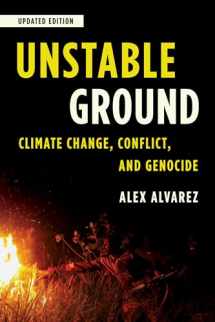
Unstable Ground: Climate Change, Conflict, and Genocide, Updated Edition (Studies in Genocide: Religion, History, and Human Rights)
Book details
Summary
Description
Review
Alvarez, professor of criminology and criminal justice at Northern Arizona University, examines climate change and its effect on conflicts in this thoughtful academic volume. He argues that the pressing issue regarding climate change is the role it plays in ‘helping create certain kinds of conflict,’ particularly ‘communal and ethnic violence, war, and genocide.’ Alvarez lays out a few ways in which environmental shifts can affect populations and occasionally lead to famine and war. He cites as an example the record heat waves that struck India and Pakistan in the summer of 2016, which melted pavement and killed over 1,000 people. Alvarez also discusses access to natural resources such as wood, oil, and gas, explaining that they ‘allow a state to meet the basic survival needs of its citizens.’ Water, Alvarez notes, is often taken for granted in industrialized nations ‘where cheap and apparently endless supplies of fresh water are readily available.’ He writes of the massive drought that ravaged Syria from 2006–2011 and bears some responsibility for the subsequent conflict there. On the flip side, populations are equally threatened by flooding rivers and rising sea levels. Alvarez’s thoughtful and precise work highlights some deeply troubling but underdiscussed aspects of climate change. ― Publishers Weekly
Beginning with his hometown of Flagstaff, Arizona, Alvarez then moves around the globe to show how the local and global need to be thought of together with regard to climate change, violence, and death. This approach is, essentially, one significant path towards acknowledging the severity and pervasiveness of some of the globe’s most vital and pressing issues, as well as one that often blocks the way for many people who see nothing wrong at home and therefore see no tie to the broader global community. The book is an extended exercise for the author to come to terms with some of today's most monumental issues. Alvarez is not making the case for the existence of climate change or humanity’s causal relationship to it. These are scientific facts that form the background of the book and need no further explanation or expansion. Instead, the author investigates how humanity will potentially deal with this clear and present danger. An intriguing work that explores an existential crisis without existentialism, for those willing to confront some ugly truths about humanity.
Summing Up: Highly recommended. All levels/libraries. ― Choice
Unstable Ground provides a guide to understanding the many and varied implications of climate change—including environmental destruction, mass migration, and dissolution of established borders; the need to rethink issues of national security; and the existential question of life on planet Earth—if there is not enough action now to stem the self-inflicted wound. Alvarez’s timely book is essential reading for citizens, policy makers, and scholars. -- Roger W. Smith, College of William & Mary
Alvarez has written one of the first, and most assuredly the best, analyses of the connection between climate change and genocide. As one of the top genocide scholars, he has combined his in-depth knowledge of that subject with the most important and up-to-date research on climate change. Alvarez is not afraid to confront the possible connection between future political violence and the changing environment on our planet. His analysis is a warning that must be heeded by policy makers from both industrialized and less industrialized countries. -- Herbert Hirsch, Virginia Commonwealth University
Climate change, the critical defining catastrophe of our time, is simultaneously a scientific and a human concern. In this pathbreaking volume, Alvarez has combined a number of approaches to the core issue in order to show just what this will portend for the future—a future in which violence, genocide, and population collapse are entirely likely unless the means can be found to address the slide towards disaster. T


We would LOVE it if you could help us and other readers by reviewing the book
Book review



